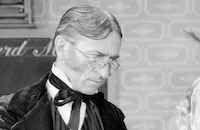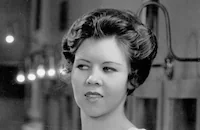Lady Bodyguard
Brief Synopsis
Cast & Crew
William Clemens
Eddie Albert
Anne Shirley
Raymond Walburn
Ed Brophy
Donald Macbride
Film Details
Technical Specs

Synopsis
For publicity, A. C. Baker, an advertising representative at Western Fidelity Insurance, offers ten typical young Americans a $1,000 life insurance policy. Having signed nine, A. C. approaches test pilot Terry Moore to be her tenth and final endorsement. Because he finds A. C. attractive, Terry promises to sign if she will have dinner with him. In the meantime, after she is fired, an angry secretary writes Terry's policy for one million dollars instead of one thousand dollars. That night Terry takes A. C. to a cheap nightclub, where he is popular because he spends his money freely. As his beneficiaries, Terry lists the bartender, Harry Gargan; a drunk, R. L. Barclay; and the hat check woman, Mother Edna Hodges. Later, Terry makes a pass at A. C., but she waits until he signs the policy before throwing a drink in his face and leaving. After the mistake is discovered, A. C. begs Terry to cancel his policy and sign a new one, but he refuses. The news reaches Terry's beneficiaries, who immediately plan what they will do with the money should Terry die. Meanwhile, A. C.'s boss, George MacAlister, orders her to stick close to Terry and make sure nothing happens to him. Learning that Terry has a test flight the following day, A. C. first tries to convince the airline to ground him and then lures him to a sanitarium, where he is held by force. After the flight, A. C. informs Terry that the plane crashed during the test. They quarrel bitterly, but by the end of the evening, have fallen in love and decide to get married. Although Terry agrees to cancel his policy, MacAlister asks him to keep it as the publicity over the mixup has resulted in a boost to the business. Learning of Terry's plans, the beneficiaries decide they must kill him before he marries and changes his policy in favor of his wife. Because Terry and A. C. are flying to Las Vegas for the wedding, Mother Hodges invites them to the nightclub for a celebration and bakes a wedding cake laced with sleeping powder to cause Terry to fall asleep and crash his plane. Before Terry can eat the cake, however, it is destroyed in an accident. Mother Hodges then convinces them to have some of her famous chicken soup, which unknown to Terry and A. C., comes from a can, and mixes the soup with more sleeping powder. To prevent the drowsy Terry and A. C. from changing their minds and leaving in the morning, Mother Hodges, Harry, and Barclay drive them to the airport. They then turn down Terry's invitation to accompany him to Las Vegas, but Terry tricks them into entering the plane and takes off before they are aware of what he is doing. During the flight, Mother Hodges, Harry and Barclay spend their time keeping Terry awake. The plane lands safely, and Terry and A. C. are married.

Director
William Clemens
Cast

Eddie Albert

Anne Shirley

Raymond Walburn

Ed Brophy

Donald Macbride

Maude Eburne

Clem Bevans

Roger Pryor
Gus Schilling

Olin Howlin

Charles Halton
Warren Ashe
Jack Norton

Mary Treen

Greta Granstedt
Oscar O'shea

Emmett Vogan
John H. Dilson
Harlan Briggs
George Carleton
Gordon Demain
Frances Morris
Jack Stoney
Fred Graham
Kernan Cripps
Murray Alper
Charles R. Moore
Sam Ash
Wilbur Mack
Jack Gardner
Al Hill
Matt Mchugh

Peter Leeds
Harry Tyler
William Newell
Stanley Blystone
Gloria Williams
Ethel Clayton
Crew
Art Arthur
Vera Caspary
Haldane Douglas
Hans Dreier
Daniel Fapp
Gene Garvin
Edward Haldeman
Edmund Hartmann
Burt Kelly
Gene Merritt
Eddie Salven
George Sawley
William Shea
Sol C. Siegel
Irvin Talbot
Wally Westmore

Film Details
Technical Specs

Articles
Eddie Albert (1906-2005)
The son of a real estate agent, Albert was born Edward Albert Heimberger in Rock Island, Ill., on April 22, 1906. His family relocated to Minneapolis when he was still an infant. Long entralled by theatre, he studied drama at the University of Minnesota. After years of developing his acting chops in touring companies, summer stock and a stint with a Mexican circus, he signed a contract with Warner Bros. and made his film debut in Brother Rat (1938). Although hardly a stellar early film career, he made some pleasant B-pictures, playing slap happy youths in Brother Rat and a Baby (1940), and The Wagons Roll at Night (1941).
His career was interrupted for military service for World War II, and after his stint (1942-45), he came back and developed a stronger, more mature screen image: Smash-Up: The Story of a Woman (1947); Carrie (1952); his Oscar® nominated turn as the Bohemian photographer friend of Gregory Peck in Roman Holiday (1953); a charming Ali Hakim in Oklahoma (1955); and to many critics, his finest hour as an actor, when he was cast unnervingly against type as a cowardly military officer whose lack of commitment to his troops results in their deaths in Attack! (1956).
As he settled into middle-age, Albert discovered belated fame when he made the move to Hooterville. For six seasons (1965-71), television viewers loved Eddie Albert as Oliver Wendal Douglas, the bemused city slicker who, along with his charming wife Lisa (Eva Gabor), takes a chance on buying a farm in the country and dealing with all the strange characters that come along their way. Of course, I'm talking about Green Acres. If he did nothing else, Alberts proved he could be a stalwart straight man in the most inane situations, and pull it off with grace.
After the run of Green Acres, Albert found two of his best roles in the late stages of his career that once again cast him against his genial, good-natured persona: the fiercly overprotective father of Cybill Shepherd in The Heartbreak Kid (1972), for which he earned his second Oscar® nomination; and the sadistic warden in Robert Aldrich's raucous gridiron comedy The Longest Yard (1974). Soon, Albert was in demand again, and he had another hit series, playing a retired police officer who partners with a retired con artist (Robert Wagner) to form a detective agency in Switch (1975-78).
The good roles slowed down slightly by the dawn of the '80s, both film: The Concorde: Airport '79 (1979), How to Beat the High Co$t of Living (1980), Take This Job and Shove It (1981); and television: Highway to Heaven, Murder, She Wrote, Thirtysomething, offered him little in the way of expansion. Yet, Albert spent his golden years in a most admirable fashion, he became something of activist for world health and pollution issues throughout the latter stages of his life. It is widely acknowledged that International Earth Day (April 22) is honored on his birthday for his tireless work on environemental matters. Albert was married to famed hispanic actress Margo (1945-85) until her death, and is survived by his son, actor Edward Albert, a daughter, and two granddaughters.
by Michael T. Toole

Eddie Albert (1906-2005)
Quotes
Trivia
Notes
According to news items, this was to be New York radio director Adrian Samish's motion picture directorial debut, and Robert Preston and Ellen Drew were slated for the lead roles. Hollywood Reporter also reported that some scenes were shot on location in Girard, CA and at the Metropolitan Airport in Van Nuys, CA.














